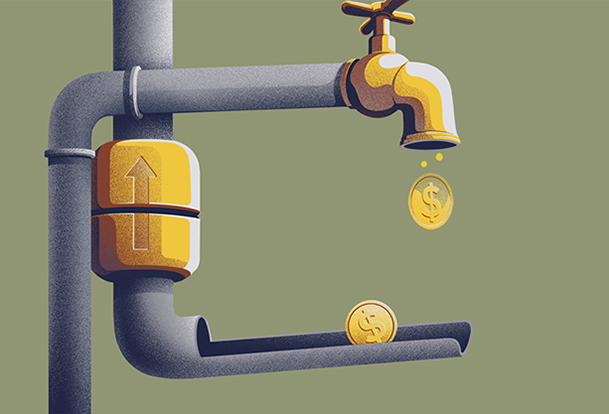Know the Lingo: Stock Trading Terms
Published on May 6, 2019
minute read
Share:
American depository receipts (ADRs)
An American depository receipt (ADR) is a security that represents the publicly traded shares of a non-U.S. company. An ADR is typically created when a U.S. bank buys a foreign company's shares in its domestic market and re-issues them in the United States.
Bid/Ask
Bid refers to the highest price a buyer is prepared to pay for a stock and ask is the lowest price at which a seller is prepared to sell. The spread is the difference between the bid and ask, and is a key measure of the liquidity of the stock (see Liquidity below).
Common stock
Most common stock consists of ordinary shares that come with voting rights. A company can have more than one class of stock (for example, Class A and Class B), with different voting rights and dividend payments for each.
Dividend
A dividend is a payment a company makes to a shareholder, usually to distribute company profits. Dividends are typically paid quarterly.
DRIP
A DRIP, or Dividend Reinvestment Plan, automatically reinvests the cash dividends you receive on your stock (or exchange-traded fund) investments into more shares or units of your investment. Not all securities are eligible. Check the Detailed Quote page for more information.

EPS
EPS stands for earnings-per-share. It is the profit a company earns minus the cost of doing business. It is calculated by dividing the total earnings available to common shareholders by the number of outstanding shares listed on the balance sheet.
Equity derivatives
Equity-based options, rights, warrants and equity-linked notes are equity derivatives because their prices will change as the price of the underlying security changes. Learn more about options.
Fundamentals
Fundamental analysis can provide a better understanding of a company's value, which can help you determine if a company is the right investment choice for you. Analysts may look at price-to-earnings (P/E) ratios, price-to-book (P/B) ratios and return on equity (ROE), among other metrics, to determine a company's intrinsic or true value. You can also use this information to compare companies against their industry peers and the market.
Leverage
When you borrow money and use that money to buy investments, it's known as margin or leveraged investing. Typically, this is done through a margin account. (See Margin below.)
Limit order
When you place a limit order, you specify the maximum price you are willing to pay when buying a security (or minimum you're willing to accept when selling), along with the number of shares. Your order will be entered in the system and will stay open until it is filled, cancelled, or if it expires.
Liquidity
Liquidity describes the degree to which a stock or other asset can be quickly bought or sold in the market. Stocks that trade often and in large volumes will have the highest level of liquidity, which is generally desired.
Common stock is generally more easily bought or sold than other assets, like real estate, art or jewelry. This means investors can usually liquidate or add to their stock positions with relative ease.
Margin
If you choose to invest using margin, you are borrowing money from RBC Direct Investing and using your investments as collateral. Margin is the difference between the total market value of the securities you hold in a margin account and the amount loaned to you. Margin magnifies portfolio volatility. Also, investments on margin are exposed to interest rate risk. If rates increase, the cost of borrowing will be greater, making it harder to earn positive returns. The opposite is also true.
Market capitalization
Market capitalization is the total value of a company's shares. The simple calculation is the total number of outstanding shares multiplied by the current share price. So, if Company A has 10 million shares outstanding and the current price of one share is $10, its market cap would be $100 million.

Market order
A buy or sell order that's typically executed immediately at the best available price. Market orders placed outside of trading hours would be filled at the best available price in the next trading session.
Preferred shares
Preferred shares offer a combination of equity and fixed-income features. Like stocks, preferreds have a share price and represent an ownership stake; like bonds, they can offer a steady stream of income, but in the form of fixed dividends. They're considered income investments, but technically they are equities. Preferred shareholders have a higher claim on the assets and earnings of a company than common shareholders.
Private equity
Private equity is an alternative investment class that refers to shares or ownership rights of private companies that do not trade on an exchange.
Short selling
Short selling is selling stock that you don't own in order to profit from an anticipated price decline. In essence, you borrow the shares and sell them at the current market price with the hope of buying them back in the future at a lower price.
Stock split
A stock split is a corporate action that increases the number of outstanding shares. For example, in a 2-for-1 stock split, the number of shares outstanding would double since each share would effectively split into two. A stock split reduces the price of each share so the overall value of your holdings doesn't change.
Stop order
When selling, a stop order, also commonly known as a stop-loss order, is when you pick the price that will trigger the sell order for your stock. That trigger is known as the stop price, and it must be below the last traded price. When the stock reaches that point, a market order is created to sell. It's important to note that your stop price won't necessarily be the sell price. It will be sold at the first available price after the market order is placed. This means that if the stock is falling quickly, you could end up selling at a price lower than your original stop price.
Voting privileges
Common stock shareholders typically have the right to vote on certain matters that affect the company, such as company leadership and other key decisions.
Volatility
Volatility is a measure of risk. The higher the volatility, the greater the risk. Beta is one measurement of risk when looking at investments such as stocks.
RBC Direct Investing Inc. and Royal Bank of Canada are separate corporate entities which are affiliated. RBC Direct Investing Inc. is a wholly owned subsidiary of Royal Bank of Canada and is a Member of the Investment Industry Regulatory Organization of Canada and the Canadian Investor Protection Fund. Royal Bank of Canada and certain of its issuers are related to RBC Direct Investing Inc. RBC Direct Investing Inc. does not provide investment advice or recommendations regarding the purchase or sale of any securities. Investors are responsible for their own investment decisions. RBC Direct Investing is a business name used by RBC Direct Investing Inc. ® / ™ Trademark(s) of Royal Bank of Canada. RBC and Royal Bank are registered trademarks of Royal Bank of Canada. Used under licence.
© Royal Bank of Canada 2022.
Any information, opinions or views provided in this document, including hyperlinks to the RBC Direct Investing Inc. website or the websites of its affiliates or third parties, are for your general information only, and are not intended to provide legal, investment, financial, accounting, tax or other professional advice. While information presented is believed to be factual and current, its accuracy is not guaranteed and it should not be regarded as a complete analysis of the subjects discussed. All expressions of opinion reflect the judgment of the author(s) as of the date of publication and are subject to change. No endorsement of any third parties or their advice, opinions, information, products or services is expressly given or implied by RBC Direct Investing Inc. or its affiliates. You should consult with your advisor before taking any action based upon the information contained in this document.
Furthermore, the products, services and securities referred to in this publication are only available in Canada and other jurisdictions where they may be legally offered for sale. If you are not currently a resident of Canada, you should not access the information available on the RBC Direct Investing Inc. website.
Inspired Investor brings you personal stories, timely information and expert insights to empower your investment decisions. Visit About Us to find out more.










